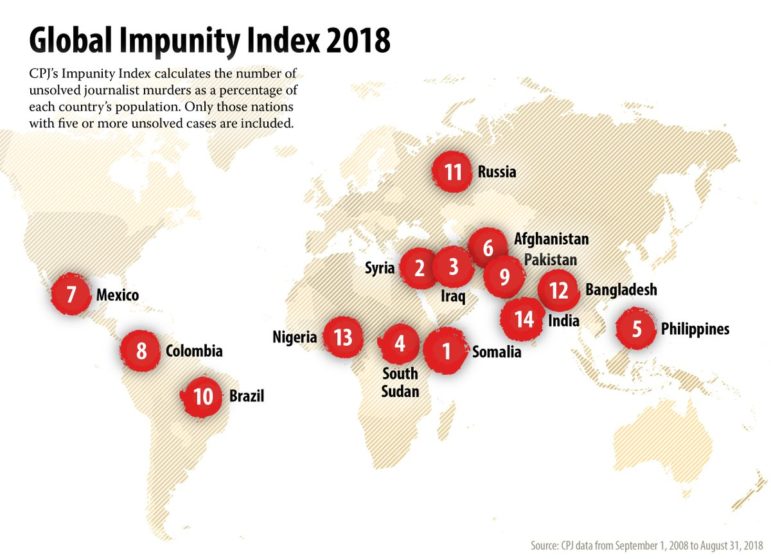 Over the past 12 years, close to 1,010 journalists have been killed for reporting the news and bringing information to the public. On average, this constitutes one death every four days. In nine out of 10 cases the killers go unpunished.
Over the past 12 years, close to 1,010 journalists have been killed for reporting the news and bringing information to the public. On average, this constitutes one death every four days. In nine out of 10 cases the killers go unpunished.
Impunity leads to more killings and is often a symptom of worsening conflict and the breakdown of law and judicial systems. Impunity damages whole societies by covering up serious human rights abuses, corruption and crime.
On International Day to End Impunity for Crimes against Journalists, we remember fearless investigative journalists who were murdered for doing their jobs, including Daphne Caruana Galizia, Miroslava Breach, Pavel Sheremet, Mohammed Al-Absi, Javier Valdez, Jan Kuciak, and many more who have given or are risking their lives in pursuit of the truth.
It is in recognition of the far-reaching consequences of impunity, especially of crimes against journalists, that the United Nations General Assembly adopted Resolution A/RES/68/163 at its 68th session in 2013 which proclaimed November 2 as International Day to End Impunity for Crimes against Journalists. The date was chosen in commemoration of the assassination of two French journalists in Mali on November 2 2013.
The Resolution urged Member States to implement measures countering the present culture of impunity. Governments, civil society, the media and everyone concerned with upholding the rule of law are asked to join in the global efforts to end impunity. You can join in these commemoration events around the world.
#TruthNeverDies
To increase public awareness of the issue, UNESCO has launched the #TruthNeverDies campaign, to encourage the publication of articles written by, or in tribute to, journalists killed for doing their job.
UNESCO also has released a Report on the Safety of Journalists and the Dangers of Impunity, which highlights the increase in the number of journalists killed outside of armed conflict zones in recent years. Indeed, last year, a majority of slain journalists (55 percent) were not killed in conflict zones — many were reporting on topics tied to corruption, crime and political wrongdoing.
As Audrey Azoulay, UNESCO director-general, said in her message: “The fight against impunity is inseparable from the defense of fundamental freedoms such as freedom of expression, freedom of the press and freedom of access to information. It is our responsibility to ensure that crimes against journalists do not go unpunished. We must see to it that journalists can work in safe conditions which allow a free and pluralistic press to flourish.”
Global Impunity Index
The Committee to Protect Journalists also released its annual Global Impunity Index, which calculates the number of unsolved journalist murders as a percentage of each country’s population, ranking each country. This year’s top 10 offenders, in order, are: Somalia, Syria, Iraq, South Sudan, Philippines, Afghanistan, Mexico, Colombia, Pakistan and Brazil.

Somalia tops the list for the fourth year in a row and two countries rejoin the list of offenders, including Afghanistan where a suicide bomb targeted a group of journalists in Kabul, killing nine. Colombia also reappeared on the ranks after a breakaway faction of a guerrilla group with alleged ties to drug trafficking kidnapped an Ecuadoran news crew near the border and murdered them in Colombian territory. Both nations had fallen off the index in recent years as violent conflict receded.
This was adapted from highlights of the UNESCO’s International Day to End Impunity commemorations in 2018 and the Committee to Protect Journalists’ Global Impunity Index report.
